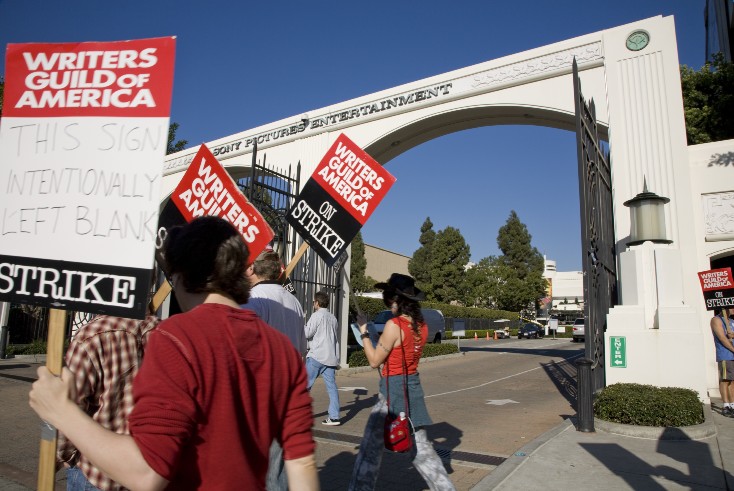‘Streamers will be worst hit’: How the US writers’ strike impacts UK TV and cinema

The Writers’ Guild of America (WGA) this week voted overwhelmingly in favour of a strike authorisation.
The Guild, which represents over 11,000 film and television writers, has alleged its writers have been unfairly compensated in recent years, especially as rising cost-of-living has made work in the entertainment industry untenable for many aspiring professionals.
The Guild’s current contract with Alliance of Motion Picture and Television Producers (AMPTP) expires on 1 May. Contract negotiations have thus far been unsatisfactory to Guild members.
The vote to strike was approved with 97.85% of members voting yes.
Assuming the strike goes ahead upon the lapsing of the Guild’s current contract, it would mark the first time since November 2007 that Hollywood’s writers went on strike. That strike lasted 100 days, and left a significant impact on the global entertainment industry. Numerous popular shows, such as ABC’s Pushing Daisies and NBC’s Heroes, were significantly impacted by the strikes, as were late night programs like NBC’s The Tonight Show and Late Night. NBCUniversal even took the extraordinary step at the time of returning cash to advertisers as ratings tumbled short of expectations.
In a statement shared with Variety, the Writers’ Guild of Great Britain (WGGB) said it was ready to stand in solidarity with its US counterpart should the strike go ahead.
“Their fight is our fight,” wrote WGGB chair Lisa Holdsworth. “We hope that the WGA reaches a deal but we are ready to stand shoulder to shoulder with our sister union and their members in support of every writer’s right to be paid a decent rate for their work, to be treated with respect and to be financially rewarded for the success of their work – including subsequent use and sales.”
Per Variety, the WGGB executive council last week supported a motion that stated that if a WGA strike goes ahead, the UK union would advise its membership not to work on projects within the jurisdiction of the WGA for the duration of the strike.
‘Fresh scripted content is their promotional lifeblood’
The Media Leader columnist and TV industry veteran Stephen Arnell anticipates the effect of the strike is likely to be felt in the UK “in short order”, assuming it impacts shows like Saturday Night Live (broadcast in the UK on Sky Comedy) and long-running American procedural crime/medical dramas that play on UKTV, Channel 5, and Sky.
However, British broadcasters have taken steps since 2007 to expand homegrown content, which may insulate them from some of the negative effects of the strike.
“The BBC and ITV have far less US content than previously, but it still is a draw for younger viewers on their video-on-demand (VOD) platforms, so they will also take a smaller hit on popular shows such as Superman & Lois and prestige mini-series,” Arnell says.
According to Arnell, streamers are likely to be the worst hit by any such strike. “Fresh scripted product is their promotional lifeblood,” he adds.
As revenue generators, streaming services are already embattled. Between Disney, NBCUniversal (owned by Comcast), Paramount, and Warner Bros Discovery, streaming platforms have lost in excess of $18bn since 2020 as they seek to challenge Netflix for VOD market share, and they may struggle to retain subscribers if they are unable to turn around new scripted content.
‘Opportunity for increased activity from outside the US’
The strike is also occurring at an inopportune time for cinemas, which are still yet to recover from pandemic lockdowns. John Partilla, CEO of US cinema advertiser Screenvision, has attributed the lag in return to cinemagoing to a relatively weak product slate, including a dearth of non-blockbuster films.
The slow recovery has sent some cinema chains reeling. This month, Cineworld, the world’s second-largest cinema chain, filed a reorganisation plan with a Texas bankruptcy court, outlining the company’s intent to restructure its $5bn in debt.
Davina Barker, sales director at UK cinema advertiser Digital Cinema Media (DCM), tells the The Media Leader the writer’s strike would not have any immediate effects on UK cinemas. “Movie studios work about a year ahead, and one of cinema’s unique selling propositions is that we know our content 12-18 months in advance.”
“If the strikes go ahead the initial impact would more likely be for TV programmes that are written and produced on tighter schedules.”
However, Barker admits that the strike does present some risk for titles set to release in 2024 and 2025, though she said the cinema industry would still have a “pipeline of content, even if at a slower rate” thanks to stockpiled screenplays that could be produced.
Projecting confidence, Barker even says that strike action could have silver linings for the UK cinema industry, especially as recent work by BAFTA, the BFI, and BIFA has sought to better showcase new voices in British filmmaking. “As with previous strikes, depending on how long they go on for, this could provide an opportunity for diversification of content and in particular increased activity from outside the US.”



